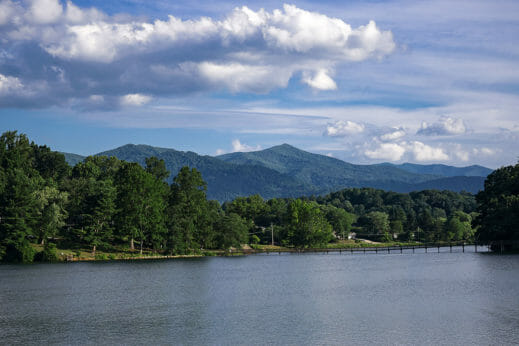3 Agritourism Hotspots to Visit This Summer
From the southern highlands to the foggy California coast and Canadian beach towns, these fun, farm-centric destinations offer a fun and different summer vacation.
3 Agritourism Hotspots to Visit This Summer
From the southern highlands to the foggy California coast and Canadian beach towns, these fun, farm-centric destinations offer a fun and different summer vacation.

Many regions have farms that also run (or partner with other organizations to run) restaurants, breweries or distilleries, B&Bs, workshops, and other interesting experiences, making these areas great choices for summer road trips. Here are three of our favorite picks.
Haywood County, North Carolina

This picturesque part of the Appalachians lies west of Asheville, on the way to Great Smoky Mountain National Park. Despite the rugged terrain – Haywood County has the highest average elevation (3600 feet) of any county east of the Rockies – more than 700 small farms are tucked into the hills, hollows and valleys.
Known For: Ramps, ginseng, and moonshine
Local Flavor: The region has a long history of mountain crafts, from the illegal (bootlegging whiskey) to the artful (weaving and pottery). More recently, it’s become a haven for urban expats and back-to-the-landers of every stripe.
Sights and Sounds: The Blueridge Parkway snakes through the high mountains on its way to Asheville – a great way to soak in the serenity of the Appalachians. Haywood County’s small towns are a great place to soak in the local bluegrass scene.
Where to Eat: Frog Leap Public House in Waynesville sources a hearty portion of it menu – from the collards and ham hocks to the pickled ramp chevre and the pecan-crusted sunburst trout – through local purveyors.
What to Drink: The “flavored” moonshines of Elevated Mountain, a craft distiller of top-shelf whiskeys in Maggie Valley. The distillery is open for tastings and tours, where you learn a bit of local moonshine lore and hear about the farms the company sources from.
A Cool Farmstay to Consider: Pigeon Valley Farms, just west of Asheville, offers three rooms for rent plus a 200-square-foot “tiny house.” It’s more a permaculture homestead than a farm, with options to pitch in on garden and livestock chores.
Mendocino County, California

This coastal enclave in northern California has quietly transformed from a lumberjack-sort-of-place to a foodie destination for Bay Area hipsters.
Known For: Wine, weed, and wild mushrooms
Local Flavor: A quieter version of Napa with a bit of NorCal pot-grower vibe thrown in for good measure.
Sights and Sounds: The coastal hills of are carpeted in lush redwood forests, where many a wild fungi are found. The beaches are pristine, but the water is frigid – a surfer’s paradise.
Where to Eat: At the MacCallum House, in the sleepy, but pricey hamlet of Mendocino, chef Alan Kantor serves up local cheeses, foraged berries, and the region’s famous Dungeness crab and abalone. Kantor honors his purveyors on a food-shed map found in the restaurant foyer.
What to Drink: Summer Solstice Ale from Anderson Valley Brewery. This solar-powered brewery also offers an 18-hole disc golf course.
A Cool Farmstay to Consider: The Apple Farm, founded by Don and Sally Schmitt (the couple who created Napa’s famed French Laundry restaurant in the seventies), offers three bungalows set in a 30-acre orchard. Guests have the option of cooking one garden-fresh meal each day with the family. Located in Anderson Valley, a Garden of Eden-sort-of-place tucked between the mountains, you’ll be in the center of Mendocino’s County’s artisanal farm scene.
Prince Edward County, Ontario

Located midway between Toronto and Montreal, and about two hours from the border crossing near Watertown, New York, this Lake Ontario peninsula has long been known for its miles of white sand beaches. But more recently, The County, as locals call it, has become a major agritourism destination, with scores of wineries, artisanal creameries, and festivals.
Known For: Hops, berry farms, u-pick orchards, and maple syrup
Local Flavor: Vogue has billed Prince Edward County as the “Hudson Valley of Canada.” This is where Toronto/Montreal food scene parties on the weekend.
Sights and Sounds: Sandbanks Provincial Park boasts enormous dunes and crystal-clear water. The beach gets crowded on summer weekends, so get your suntan during the week and tour the countryside on the fin de semaine.
Where to Eat: The Drake Devonshire, in the hamlet of Wellington, is the sole rural iteration of a famed Toronto food and lodging empire. The menu is chock-full of fare from the nearby hills and estuaries.
What to Drink: The Prince Edward County VQA is a recently designated appellation – this is no Napa or Bordeaux – so keep your expectations modest. That said, the 2009 Ti-Rouge from Redtail, an 11-acre organic solar-powered winery near Consecon, is a fun, fruity place to start.
A Cool Farmstay to Consider: The Fronterra Farm Brewery offers one of the more unique lodging options in the area: “log-framed canvas prospector tents,” featuring an ensuite bathroom and outdoor kitchen. Their “organic heirloom permaculture gardens” produce not only food for your stay, but the hops and barley for the beer brewed on-site.
Follow us
This work is licensed under a Creative Commons Attribution-NoDerivatives 4.0 International License.
Want to republish a Modern Farmer story?
We are happy for Modern Farmer stories to be shared, and encourage you to republish our articles for your audience. When doing so, we ask that you follow these guidelines:
Please credit us and our writers
For the author byline, please use “Author Name, Modern Farmer.” At the top of our stories, if on the web, please include this text and link: “This story was originally published by Modern Farmer.”
Please make sure to include a link back to either our home page or the article URL.
At the bottom of the story, please include the following text:
“Modern Farmer is a nonprofit initiative dedicated to raising awareness and catalyzing action at the intersection of food, agriculture, and society. Read more at <link>Modern Farmer</link>.”
Use our widget
We’d like to be able to track our stories, so we ask that if you republish our content, you do so using our widget (located on the left hand side of the article). The HTML code has a built-in tracker that tells us the data and domain where the story was published, as well as view counts.
Check the image requirements
It’s your responsibility to confirm you're licensed to republish images in our articles. Some images, such as those from commercial providers, don't allow their images to be republished without permission or payment. Copyright terms are generally listed in the image caption and attribution. You are welcome to omit our images or substitute with your own. Charts and interactive graphics follow the same rules.
Don’t change too much. Or, ask us first.
Articles must be republished in their entirety. It’s okay to change references to time (“today” to “yesterday”) or location (“Iowa City, IA” to “here”). But please keep everything else the same.
If you feel strongly that a more material edit needs to be made, get in touch with us at [email protected]. We’re happy to discuss it with the original author, but we must have prior approval for changes before publication.
Special cases
Extracts. You may run the first few lines or paragraphs of the article and then say: “Read the full article at Modern Farmer” with a link back to the original article.
Quotes. You may quote authors provided you include a link back to the article URL.
Translations. These require writer approval. To inquire about translation of a Modern Farmer article, contact us at [email protected]
Signed consent / copyright release forms. These are not required, provided you are following these guidelines.
Print. Articles can be republished in print under these same rules, with the exception that you do not need to include the links.
Tag us
When sharing the story on social media, please tag us using the following: - Twitter (@ModFarm) - Facebook (@ModernFarmerMedia) - Instagram (@modfarm)
Use our content respectfully
Modern Farmer is a nonprofit and as such we share our content for free and in good faith in order to reach new audiences. Respectfully,
No selling ads against our stories. It’s okay to put our stories on pages with ads.
Don’t republish our material wholesale, or automatically; you need to select stories to be republished individually.
You have no rights to sell, license, syndicate, or otherwise represent yourself as the authorized owner of our material to any third parties. This means that you cannot actively publish or submit our work for syndication to third party platforms or apps like Apple News or Google News. We understand that publishers cannot fully control when certain third parties automatically summarize or crawl content from publishers’ own sites.
Keep in touch
We want to hear from you if you love Modern Farmer content, have a collaboration idea, or anything else to share. As a nonprofit outlet, we work in service of our community and are always open to comments, feedback, and ideas. Contact us at [email protected].by Brian Barth, Modern Farmer
June 25, 2018
Modern Farmer Weekly
Solutions Hub
Innovations, ideas and inspiration. Actionable solutions for a resilient food system.
ExploreShare With Us
We want to hear from Modern Farmer readers who have thoughtful commentary, actionable solutions, or helpful ideas to share.
SubmitNecessary cookies are absolutely essential for the website to function properly. This category only includes cookies that ensures basic functionalities and security features of the website. These cookies do not store any personal information.
Any cookies that may not be particularly necessary for the website to function and are used specifically to collect user personal data via analytics, ads, other embedded contents are termed as non-necessary cookies.